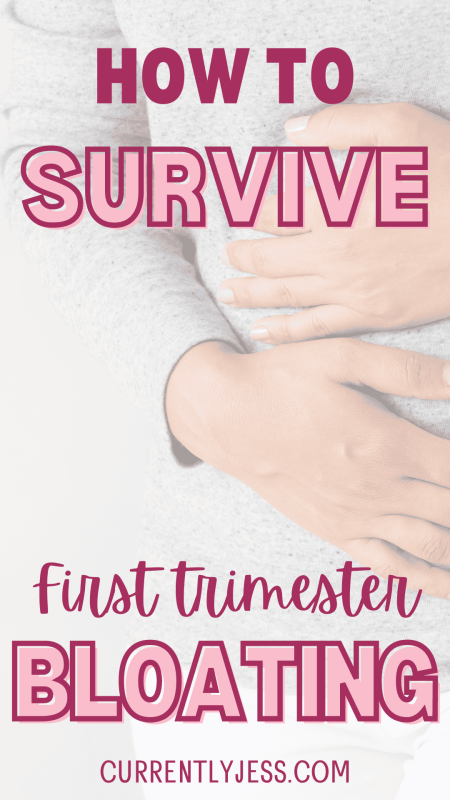Are you only a few weeks into your pregnancy but feeling like your stomach is about to pop (and maybe even look like it too? That dreaded first trimester bloating is one of the first symptoms of pregnancy you may notice, and it can be super uncomfortable.
For most people, the changes in your hormones related to your growing baby are to blame, but there are several other factors that may play a role in the bloat. And several of these you can influence by making a few minor changes in your daily life.
In today’s guide, we are going to chat about all things first trimester bloating, from what causes it to several remedies you can try to help relieve your symptoms.

Disclaimer: This post may contain affiliate links. If purchases are made through these links, I may receive a small commission at no additional cost to you. Thank you for supporting this site.
What Causes Bloating in Early Pregnancy?
Before we dive into solutions, it helps to understand what’s happening inside your body. There are a few key reasons why bloating tends to show up so early:
1. Rising Hormone Levels
Progesterone increases significantly during early pregnancy. It’s an essential hormone for supporting the uterine lining and helping maintain your pregnancy, but it also slows down digestion. That means food takes longer to move through your system, which can lead to more gas, more pressure, and more bloat.
2. Sluggish Digestion
As digestion slows down, stool and gas tend to build up. This can cause that full, tight, “I-already-look-six-months-pregnant” kind of belly — even if you’re only a few weeks in.
3. Fluid Retention
Your body is already holding on to more fluids to support your growing baby, and that can show up as bloated hands, swollen ankles, and yes, a bloated stomach too.
How to Relieve First Trimester Bloating
While you might not be able to stop the bloating entirely (thanks, hormones), there are several ways to manage it so it doesn’t take over your day.
1. Be Mindful of Diet Changes
Even small shifts in your diet — especially during pregnancy — can impact digestion. Take a look at what you’ve been eating lately. Craving more dairy? Reaching for carb-heavy comfort foods to manage morning sickness? Even healthy changes, like adding more fiber, can cause extra gas if introduced too quickly.
First trimester morning sickness can make it hard to have an appetite and eat much at all, so it is understandable if you are in survival mode and only eating what you can tolerate. Keep a food journal for a few days so you have an understanding of what you are eating and if there are any triggers that could be influencing your first trimester bloating.
2. Limit Gas-Causing Foods
There are lots of foods that tend to produce more gas as they move through your digestive system, so it is best to try to limit these foods:
- Beans and Legumes
- Cruciferous vegetables (broccoli, cauliflower, cabbage, brussels sprouts, and kale)
- Onions and garlic
- Carbonated beverages
- Dairy products
- High-fat foods
- Artificial Sweeteners
3. Watch the Salt
Salty snacks can be a comfort food craving, but they also cause your body to hang onto more fluid — which can make bloating worse. Try to stick with mostly whole foods when you can, and balance out salty meals with extra water and potassium-rich foods like bananas or avocados.
4. Eat Smaller, More Frequent Meals
When it comes to beating that first trimester bloat, think smaller more frequent meals over your typically three meals a day. Loading up on a big meal all at once can lead you to feel very full and bloated for hours due to your slower digestive system. Smaller meals more often give your body more time to process each meal without being overloaded and cause less gas.
5. Slow Down While Eating
Eating too quickly can cause you to swallow excess air, which leads to more gas and bloating. Take your time, chew thoroughly, and give your body a chance to catch up.
6. Drink Plenty of Water
Staying hydrated is so crucial during early pregnancy (and really your whole pregnancy), especially when dealing with bloating. Drinking enough water helps to keep your digestive system functioning smoothly by helping everything move through your body and can prevent constipation, which oftengoes with bloating.
According to ACOG (American College of Obstetricians and Gynecologists), pregnant women should aim to drink somewhere between eight to 12 8-ounce glasses of water a day, or a total of 64-96 ounces per day. As a nurse I usually recommend patient aim for the higher end of that, but having a goal is so important to keep you on track!
You can also eat more hydrating foods such as fruits and vegetables to help sneak in some of that extra water. Avoid too much caffeinated or sugary beverages, because they can increase dehydration and bloating.
And always keep a water bottle with you and make a goal to drink a certain amount of them per day to help you stay on track!
7. Drink with a glass, not a straw
This may seem like a silly suggestion but trust me it makes a bigger difference than you think. Drinking your water through a straw increases the likelihood of swallowing air along with that water. And like we’ve talked about before, any increase in air in your stomach leads to gas and bloating.
Try to drink most of your drinks out of a glass, mug, or even a cute water bottle that doesn’t have a straw like this one to see if that makes a difference in your first trimester bloating.
8. Get Some Exercise
Gentle movement can help encourage digestion and relieve pressure. A short walk, light stretching, or prenatal yoga can all help get things moving (literally).
Aim for about 30 minutes of activity most days, but even 10-minute walks make a difference. Always check with your provider before starting something new, especially if you’re early in your pregnancy.
9. Try A Probiotic
Probiotics support healthy digestion and help reduce gas. You can try a daily probiotic supplement (approved by your doctor) or get them naturally through foods like yogurt, kefir, or fermented veggies.
Just keep in mind that probiotics can take a few weeks to work — they’re not an instant fix.
10. Herbal Remedies
Considering herbal remedies might help ease first trimester bloating. Peppermint tea is known for its soothing effects on the stomach, while ginger tea or supplements can also help with digestion and reduce nausea.
Just be sure to check with your healthcare provider before trying any herbal remedies to make sure they’re safe for you and your baby. And always stick to recommended dosages to avoid any potential issues.
11. Try Over the Country Remedies
If bloating is still uncomfortable, talk to your doctor about using something like simethicone for gas or stool softeners (like Colace or MiraLAX) for constipation. Always check before starting any medication during pregnancy.
12. Avoid Eating Right Before Bed
Avoiding eating right before bedtime might help alleviate first trimester bloating. When you lie down after eating, gravity isn’t helping with digestion, which can lead to discomfort and bloating. Aim to finish your last meal or snack at least a few hours before hitting the hay to give your body plenty of time to digest properly. This simple adjustment could make a big difference in how you feel in the morning!
13. Wear Loose-Fitting Clothes
You might not be ready for full-on maternity wear yet, but switching to leggings, elastic waistbands, or soft dresses can make a big difference in how you feel. Tight pants or waistbands just add to the pressure and discomfort.
First Trimester Bloating Recap
Bloating during early pregnancy is incredibly common — but that doesn’t make it any less uncomfortable. From making small changes to how you eat and drink, to staying active and hydrated, there are a lot of gentle ways to ease the bloat and support your body as it adjusts to pregnancy.
Be patient with yourself, and don’t hesitate to bring up symptoms to your provider if something feels off. A little extra support can go a long way.
More First Trimester Tips
Need more help getting through those early weeks? Check out these other resources:
- Natural Morning Sickness Remedies That Actually Work
- Ultimate First Trimester Pregnancy Checklist
- Preparing for Pregnancy: 7 First Trimester Must-Haves You Can’t Do Without
- Surprising Early Pregnancy Symptoms [Before Your Missed Period]
- 12 Home Remedies for Heartburn During Pregnancy
Pregnancy can feel like a wild ride in the beginning, but you’ve got this. And if you’re feeling bloated, you’re definitely not alone.








